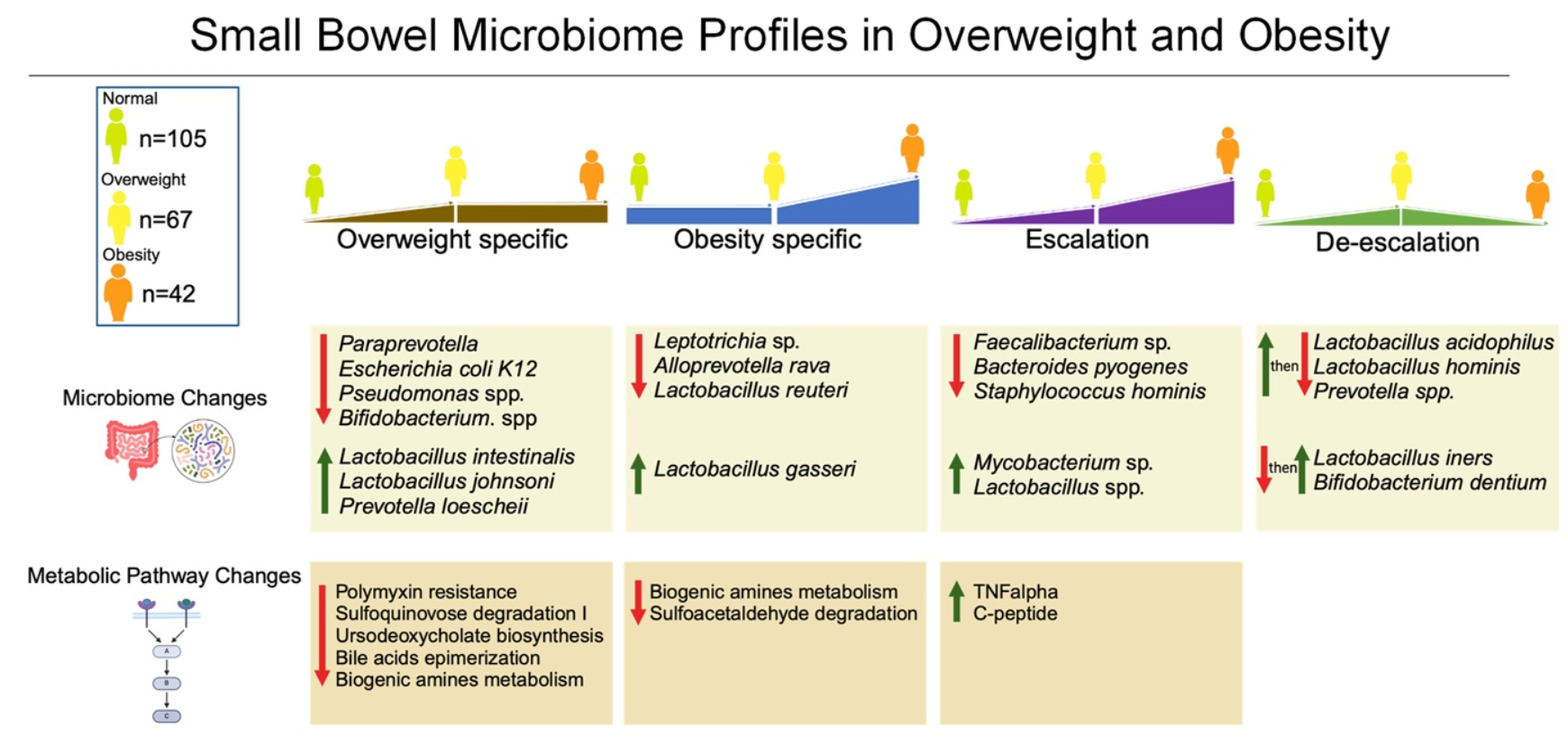In the quest to understand how gut microbes influence obesity, researchers have delved deeper into the small intestine, revealing fascinating insights that challenge previous assumptions based solely on stool samples.
Key Findings:
- Microbial Players: The small intestine harbors a unique microbial community associated with overweight and obesity. Specific changes include lower levels of 𝘉𝘪𝘧𝘪𝘥𝘰𝘣𝘢𝘤𝘵𝘦𝘳𝘪𝘶𝘮 species and 𝘌𝘴𝘤𝘩𝘦𝘳𝘪𝘤𝘩𝘪𝘢 𝘤𝘰𝘭𝘪 strain K-12 in overweight individuals, while obesity is linked to higher levels of 𝘓𝘢𝘤𝘵𝘰𝘣𝘢𝘤𝘪𝘭𝘭𝘶𝘴 𝘨𝘢𝘴𝘴𝘦𝘳𝘪 and lower levels 𝘰𝘧 𝘓. 𝘳𝘦𝘶𝘵𝘦𝘳𝘪 𝘢𝘯𝘥 𝘈𝘭𝘭𝘰𝘱𝘳𝘦𝘷𝘰𝘵𝘦𝘭𝘭𝘢 𝘳𝘢𝘷𝘢.
- Escalation and De-escalation: Some microbial changes progress with weight gain (escalation), while others show the opposite trend (de-escalation). For instance, 𝘉𝘢𝘤𝘵𝘦𝘳𝘰𝘪𝘥𝘦𝘴 𝘱𝘺𝘰𝘨𝘦𝘯𝘦𝘴 decreases with escalating weight, while 𝘓𝘢𝘤𝘵𝘰𝘣𝘢𝘤𝘪𝘭𝘭𝘶𝘴 𝘢𝘤𝘪𝘥𝘰𝘱𝘩𝘪𝘭𝘶𝘴 is classified as a de-escalation feature.
- Impact on Health: Certain microbes in the small intestine are associated with specific health conditions related to obesity, such as dyslipidemia. For example, 𝘈𝘭𝘭𝘰𝘱𝘳𝘦𝘷𝘰𝘵𝘦𝘭𝘭𝘢 𝘳𝘢𝘷𝘢 is linked to type IIb and IV dyslipidemias, while an unidentified Lactobacillus species is associated with type IIa dyslipidemia in overweight individuals.
- Strain Specificity: The effects of Lactobacillus strains on weight management vary widely. While some strains like 𝘓𝘢𝘤𝘵𝘰𝘣𝘢𝘤𝘪𝘭𝘭𝘶𝘴 𝘢𝘤𝘪𝘥𝘰𝘱𝘩𝘪𝘭𝘶𝘴 are linked to weight stabilization, others like 𝘓𝘢𝘤𝘵𝘰𝘣𝘢𝘤𝘪𝘭𝘭𝘶𝘴 𝘨𝘢𝘴𝘴𝘦𝘳𝘪 are specifically associated with obesity, potentially due to their role in lipid metabolism.
Implications:
- Targeted Therapeutics: Understanding the nuanced roles of specific microbial species and strains in weight management opens up avenues for targeted therapeutic interventions. Microbes identified as de-escalation features could serve as potential targets for stabilizing or reversing weight gain.
- Species Diversity: The diversity of Lactobacillus species and their strain-specific effects underscore the complexity of microbial interactions in obesity. Developing interventions tailored to specific species and strains may yield more effective outcomes.
- Clinical Translation: These findings emphasize the importance of directly studying the small intestine’s microbial landscape, as it differs significantly from stool samples. Future research and therapeutic development should consider the distinct microbial populations and metabolic functions in the small intestine.
This study sheds light on the intricate relationship between gut microbes and obesity, offering new insights that could pave the way for personalized interventions and more targeted approaches to weight management.
Link the study : https://tinyurl.com/2h7nbd8e
